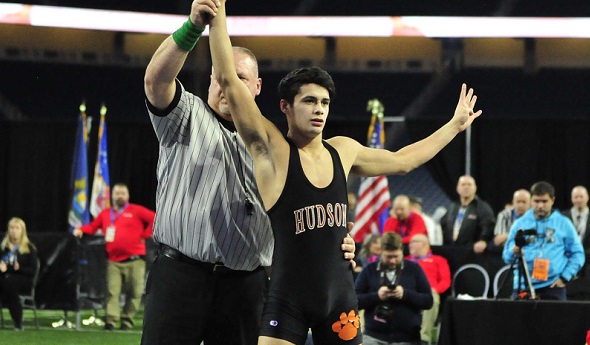
Performance: Hudson's Jordan Hamdan
March 8, 2019
 Jordan Hamdan
Jordan Hamdan
Hudson wrestling – Senior
Hamdan became the 26th wrestler to win four MHSAA Individual Finals championships when he pinned New Lothrop’s Logan Zell in 55 seconds Saturday in the Division 4 title match at 135 pounds, earning the Michigan Army National Guard “Performance of the Week.” Hamdan walked off the mat at Ford Field with a record of 48-0 this season and 208-8 for his career, and with titles as well at 112, 119 and 130 pounds.
Hamdan entered this season as one of three three-time champs in Hudson history. He had two pins and two technical falls during his final high school tournament, earning his fourth championship not long after Detroit Catholic Central’s Kevon Davenport became the 25th four-time champ earlier Saturday. Like Davenport, Hamdan also helped his team reach the highest echelon this winter as Hudson repeated as the Division 4 team champion two weeks ago.
 A pair of widely-respected mentors helped Hamdan reach this point; Hudson coach Scott Marry is the second-winningest coach in MHSAA wrestling history with 792 wins over 30 seasons, and Hamdan’s club coach Nick Simmons became the ninth four-time MHSAA champion while wrestling for Williamston from 1998-2001. Hamdan – who also played football through his junior season – will continue his wrestling career at Michigan State University. He carries a 3.5 GPA and is continuing to consider what he will major in at MSU.
A pair of widely-respected mentors helped Hamdan reach this point; Hudson coach Scott Marry is the second-winningest coach in MHSAA wrestling history with 792 wins over 30 seasons, and Hamdan’s club coach Nick Simmons became the ninth four-time MHSAA champion while wrestling for Williamston from 1998-2001. Hamdan – who also played football through his junior season – will continue his wrestling career at Michigan State University. He carries a 3.5 GPA and is continuing to consider what he will major in at MSU.
Coach Scott Marry said: “That kid has done a lot for the sport and a lot for Hudson wrestling. He is almost the perfect child; he doesn't talk back to Mom and Dad, doesn't talk back to his teachers and doesn't talk back to the coaches. You say do it, and he does it. He is a really good person beyond wrestling. … He now leaves Hudson and stands alone because now all the youth wrestlers will look at him and want to be him, and he is a really good example. He is a 3.5 student in the classroom, he has won national championships, has won four state titles and now will be going on to wrestle at a Division I school at Michigan State. That is the poster child that you want for your program.”
Performance Point: “I think it just shows the workouts I’ve been through and the work that I’ve put in has paid off,” Hamdan said of his four-championship legacy. “I think that’s the big thing. The more work I put in, the more of these achievements that I’ll be able to achieve. I can’t wrap my mind around it yet. It’s an honor. All these kids and everybody grows up looking up to these guys. Now to be one of those, it’s wild.”
Nick knows: “I train with him every summer. We work a lot on catching up things that we already know. He’s been on that level, even above college. The toughness, that comes with (training with him) a lot. It’s just tweaking all of these things, finding new ways to do certain moves that I already know that really will help me in a match when I’m not even thinking about it. … He came up and hugged me after the (championship) match and congratulated me. I think the coolest thing, when I was coming off the mat, he told me ‘Welcome to the club.’ I thought that was pretty sweet.”
For Hudson: “Growing up, I started in that program when I was 3. It’s just amazing because I’ve seen all these greats come through and just fall short. All sorts of three-timers, and everybody’s fallen short of the goal. Just to be the guy … when I won it, the guys I looked up to, some of them texted me, ‘Way to break the curse,’ because we considered it a curse because there were all these three-timers. It’s good that I can do it not just for me, but for the program.”
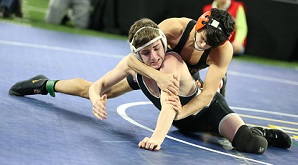 Winning attitude: “In the (wrestling) room and even out of the room, we talk to each other and always stay positive about things that are going on around us. And (we’re) always keeping a good mindset about things, even when they aren’t going your way. I think (Coach Marry) helped me with that a lot, and it helps me in a match because when something’s not going my way I can focus on the next position, try to win the next position, keep a cool, calm and collected head, and that helps a lot. With the mindset, that brought me to the next level. It just helped me so much. Even when I’m in a bad position, I feel like I’m in a good position now because I’m confident in there, I’m positive in there. Because even if I don’t win that position, I’ve still got another one and I know that, and it helps me a lot.”
Winning attitude: “In the (wrestling) room and even out of the room, we talk to each other and always stay positive about things that are going on around us. And (we’re) always keeping a good mindset about things, even when they aren’t going your way. I think (Coach Marry) helped me with that a lot, and it helps me in a match because when something’s not going my way I can focus on the next position, try to win the next position, keep a cool, calm and collected head, and that helps a lot. With the mindset, that brought me to the next level. It just helped me so much. Even when I’m in a bad position, I feel like I’m in a good position now because I’m confident in there, I’m positive in there. Because even if I don’t win that position, I’ve still got another one and I know that, and it helps me a lot.”
Team title means more: “With all the kids you train with, and everybody has the same goal. You’re fighting it for each other and not just yourself. I think that’s important to me. … I want to be an NCAA (individual) champ, obviously. But the main thing I want to do (at MSU), I want to help with the team aspect. I want to get our team to be as close as we can. Because from what I’ve experienced at Hudson, the closer you are as a team, the better you perform. That’s Hudson – that’s how it is here. Everybody is trying to support each other and trying to get better as a unit, rather than as an individual. At Hudson, you’re just growing up with that mentality; you’re doing it for someone else, not just yourself. That’s a big part of this community.”
- Geoff Kimmerly & Jeff Chaney, Second Half
Every week during the 2018-19 school year, Second Half and the Michigan Army National Guard recognizes a “Performance of the Week" from among the MHSAA's 750 member high schools.
The Michigan Army National Guard provides trained and ready forces in support of the National Military Strategy, and responds as needed to state, local, and regional emergencies to ensure peace, order, and public safety. The Guard adds value to our communities through continuous interaction. National Guard soldiers are part of the local community. Guardsmen typically train one weekend per month and two weeks in the summer. This training maintains readiness when needed, be it either to defend our nation's freedom or protect lives and property of Michigan citizens during a local natural disaster.
Past 2018-19 honorees
February 28: Kevon Davenport, Detroit Catholic Central wrestling - Read
February 21: Reagan Olli, Gaylord skiing - Read
February 14: Jake Stevenson, Traverse City Bay Reps hockey - Read
February 7: Molly Davis, Midland Dow basketball - Read
January 31: Chris DeRocher, Alpena basketball - Read
January 24: Imari Blond, Flint Kearsley bowling - Read
January 17: William Dunn, Quincy basketball - Read
November 29: Dequan Finn, Detroit Martin Luther King football - Read
November 22: Paige Briggs, Lake Orion volleyball - Read
November 15: Hunter Nowak, Morrice football - Read
November 8: Jon Dougherty, Detroit Country Day soccer - Read
November 1: Jordan Stump, Camden-Frontier volleyball - Read
October 25: Danielle Staskowski, Pontiac Notre Dame Prep golf - Read
October 18: Adam Bruce, Gladstone cross country - Read
October 11: Ericka VanderLende, Rockford cross country - Read
October 4: Kobe Clark, Schoolcraft football - Read
September 27: Jonathan Kliewer, Grand Rapids Forest Hills Northern soccer - Read
September 20: Kiera Lasky, Bronson volleyball - Read
September 13: Judy Rector, Hanover-Horton cross country - Read
PHOTOS: (Top) Hudson's Jordan Hamdan has his armed raised in victory Saturday afternoon at Ford Field. (Middle) Hamdan works toward a pin in the Division 4 135-pound championship match. (Click for more from HighSchoolSportsScene.com.)
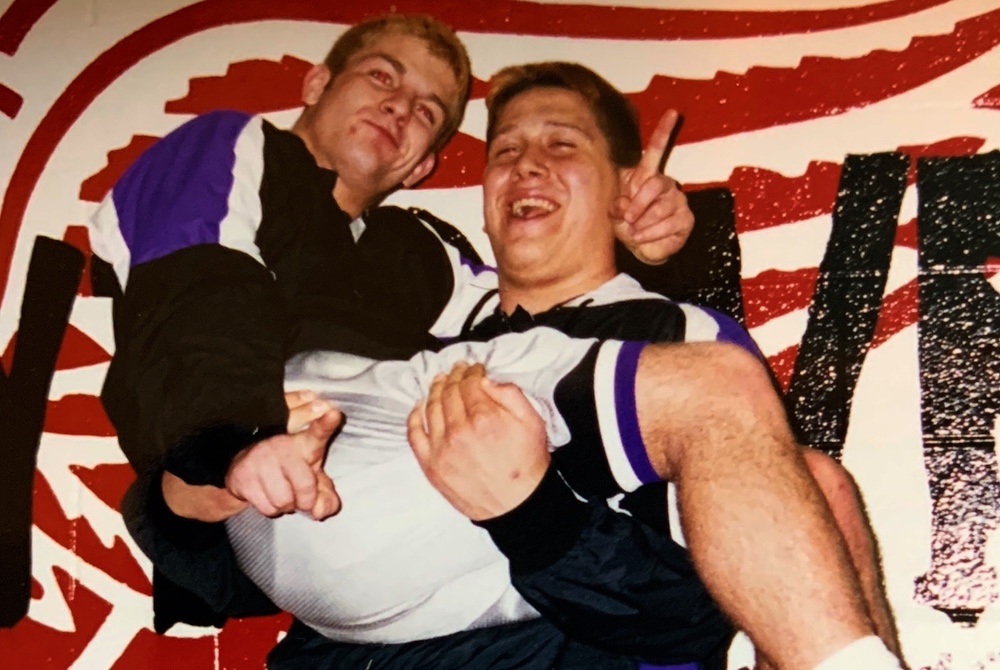
Caro Champs Find Common Ground Again as Mental Health Providers
By
Paul Costanzo
Special for MHSAA.com
July 8, 2021
Phil Millerov and Phil Niklowicz wanted to do more than simply defeat opponents when wrestling at Caro High School.
They wanted to dominate – physically and mentally.
 “We had this thing between us where we wanted to be done, and (opponents) didn’t want to come back on the mat with us,” Millerov said.
“We had this thing between us where we wanted to be done, and (opponents) didn’t want to come back on the mat with us,” Millerov said.
Twenty years later, both spend their days building people up. Millerov is a licensed professional counselor, while Niklowicz is a licensed therapist.
“I went out there looking to dominate and make sure it was known that I am the superior wrestler in all facets,” Niklowicz said. “I would try to run up as many points as fast as I can. I would teach the same thing when coaching, specifically with my nephew. You’re saying, ‘Listen, we want to break these people.’ Then the next day, in a therapy session, it’s like, ‘Let’s build up your self-esteem and set some goals to boost ourselves up.’”
The close friends and two faces of Caro’s surging wrestling program in the late 1990s now have very similar careers. Millerov – who finished second, third and first at 275 pounds in the 1998, 1999 and 2000 MHSAA Finals, respectively -- works in private practice at Transitions Counseling Service in Greenville, where he specializes in substance abuse disorders. He also has served as a Class 1 Fellow at the WK Kellogg Foundation.
Niklowicz – a two-time MHSAA Finals champion (1999 and 2000) and four-time placer – is working in private practice in Southfield, seeing mostly children. He also works in adult foster care with patients who have had traumatic brain injuries.
“He and I went and hiked Pictured Rocks at the beginning of May,” Millerov said. “And we joked about how nobody would have guessed that we’d be doing this now.”
That Millerov and Niklowicz are still close does not come as a surprise. Their friendship began when their wrestling careers did, as 6-year-olds in the Caro Growlers program. As they were becoming two of the state’s top wrestlers, they would share rides to tournaments, and their families grew close.
In high school, despite their size difference – Niklowicz wrestled at 135 his senior year – it wasn’t uncommon to see them warming up together.
“We were definitely easy going and liked to mess around a lot,” Niklowicz said. “We used to mess around before meets and throw each other. He would jump and I would throw him. People would look at us like, ‘Why is that little guy throwing that big guy?’”
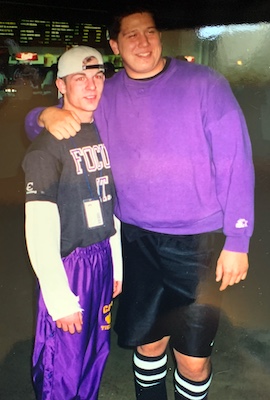 While their teams never made it out of the Regional, Millerov and Niklowicz helped set the stage for a program that would become among the best in Division 3 throughout the 2000s, qualifying for five straight Quarterfinals from 2003-07 and winning the Division 3 Finals title in 2003.
While their teams never made it out of the Regional, Millerov and Niklowicz helped set the stage for a program that would become among the best in Division 3 throughout the 2000s, qualifying for five straight Quarterfinals from 2003-07 and winning the Division 3 Finals title in 2003.
Individually, they were among the most well-known and feared wrestlers in the state.
“Niklowicz and I were fortunate to have each other, because we pushed each other,” Millerov said. “We were in constant competition with each other and ourselves. Just to kind of push each other, it was a great thing.”
Niklowicz finished fifth as a freshman and third as a sophomore before winning back-to-back titles to close out his career. In 1999, he defeated Nick Oertel of Goodrich 9-2 in the 125-pound final, and the next year he defeated Oertel’s teammate, Ryan Tripp, 7-5 at 135. Tripp would go on to win an individual title the following year. Niklowicz would finish his career with 214 victories.
“I think probably both (Finals titles) were equal,” Niklowicz said. “I think there was probably a little more stress going into my senior year. My motivation always came from improving, then it was maintaining the state title. You don’t want to go the opposite direction.”
Millerov lost a tight 6-4 decision against Remus Chippewa Hills’ Bob Kozlowski in the MHSAA Finals as a sophomore, and had an epic 12-10 match against future NFL defensive lineman Jason Babin of Paw Paw in the 1999 semifinals before fighting back to take third. The next year, he won his title via first-period pin against Dan Kliphuis, a two-time runner-up from Grand Rapids West Catholic. Millerov finished with 196 career wins and set the state record for pins in a career (160), which was broken the next season by Nick Simmons of Williamston and is now held by Justin Zeerip of Hesperia. The 56 pins Millerov recorded his senior season remains second all-time to Simmons, who had two seasons with 57.
“I never really thought about (the pin record) to be quite honest,” Millerov said. “It was just kind of in the background. It didn’t matter; all I cared about was winning this match, and I wanted to do it in the most effective, efficient way I could.”
They both continued their wrestling careers, but went their separate ways in college, with Millerov heading to Neosho County Community College in Kansas and Niklowicz to Virginia Tech.
Millerov had interest from several Division I schools coming out of high school, including some in the Big Ten, but he admits his grades weren’t good enough at the time. Neosho provided a chance to compete with some of the best in the country while at the junior college level, however, as the team took second at the National Junior College Athletic Association championships in 2002.
He transferred to Central Michigan after his sophomore year, joining his girlfriend – now his wife – who was already attending, and walking onto the wrestling team. While his relationship lasted, wrestling did not.
“I was distracted,” Millerov said. “My grandmother passed away in 2002 in that summer. I was trying to get that motivation back, and I just lost it. There has to be that edge with wrestling. When things didn’t work out, I struggled. Wrestling was my identity.”
Millerov was working to follow in his father’s footsteps and become a police officer. But the elder Phil Millerov, who died in 2012, talked his son out of it.
“Looking back on it, for me, it was obviously the right decision,” Millerov said.
The idea to go into counseling came after Millerov was married in 2006, as his wife had gotten into the program. He went back to school to earn his bachelor’s degree from CMU in 2007, and would go on to get his master’s from CMU, as well.
“I had taken a bunch of psychology courses just because I liked the field,” Millerov said. “I liked to be challenged. I liked puzzles, and with psychology, it’s like a new puzzle every hour. It just clicked. I flew through and graduated with like a 3.8. I was like, ‘Wow, I kind of feel smart.’ It was good to find something I was passionate about again.”
Millerov said he’s constantly learning and honing his craft, much like he did as a wrestler. A major difference now, however, is that he’s found more balance in his life.
“I think about working with athletes in addiction, I find a lot of similarities,” he said. “Wrestling was my life, it’s how I identified myself. I hear that same kind of talk around people struggling with addiction. One you’re considered successful for, the other you’re not. Most of my growth has been around finding balance. I find that my happiness and my clients’ as well, is when we found that balance instead of being good at just one thing. I want you to have passion, I want you to do things you love, but I also want you to be effective as a husband, a father, whatever other responsibilities you have.”
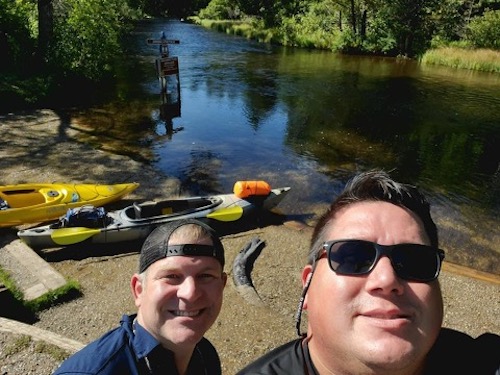 Niklowicz’s journey to becoming a therapist was more telegraphed, as both of his parents work in mental health, and he said it was always something he wanted to do, as well.
Niklowicz’s journey to becoming a therapist was more telegraphed, as both of his parents work in mental health, and he said it was always something he wanted to do, as well.
He attended Virginia Tech on a wrestling scholarship, but transferred to Eastern Michigan after one year. The Hokies had recruited him to wrestle at 133 pounds, but when the team’s 125-pounder was injured, Niklowicz was asked to cut down further. Like Millerov, he struggled when his wrestling career ended.
“I just had a really bad taste in my mouth after leaving Virginia Tech and trying to cut all this weight,” he said. “Some of it was I had lost the desire to work out, to wrestle. Fifteen years, roughly, of my life was dedicated to wrestling, and once you stop, what do I do with my winters? What do I do with seven months of the year? It was definitely a part of my identity; that’s why I got into coaching. I did MMA fighting for a little bit to have something competitive.”
Like Millerov, Niklowicz said finding balance was important.
“In the mental health field, specifically, there’s a lot of burnout for people,” he said. “Every day, you’re listening to people talking about their problems, but at the same time, they’re coming for a reason and they’re there for help, so you have to provide that help and have to motivate yourself to come to the office every day and give it your best. I try to instill the motivation that I used to other people.”
When Niklowicz looks at his time as an athlete compared to his work as a therapist, he said that work ethic is the main characteristic that has carried over.
“I think my practice mentality was the same as it was on the mat,” he said. “Even in the wrestling room, these are people I’m friends with, people I grew up with, and I still didn’t want anyone to score on me. Then you just look at your work ethic outside of wrestling, whether you’re studying for exams or motivating yourself to get up and go to class.”
While they are no longer living in the same town or living similar lives – Millerov is married with three kids, while Niklowicz is single – the connection between Caro’s dominant duo remains strong, both professionally and personally.
“I don’t think we ever thought we would be going down such a similar path, and I doubt that either one of us grew up thinking we would do the exact same thing,” Niklowicz said. “We met when we were 6 years old, and we’ve been best friends forever. I think it’s hilarious that we’ve taken such similar paths but with some glaring differences. It’s definitely interesting that we’re still really good friends after 30-some years, especially since we’ve moved on and gone our separate ways.”
2020-21 Made in Michigan
June 28: Michigan's Minor Leaguers Making Up for Lost Season - Read
PHOTOS: (Top) Caro’s Phil Millerov lifts teammate Phil Niklowicz as both celebrate Division 3 championships during the 2000 Individual Finals at Joe Louis Arena. (Middle) Niklowicz, left, and Millerov were high school warm-up partners despite wrestling at significantly different weights. (Below) Niklowicz and Millerov take a selfie during a hiking trip to Pictured Rocks National Lakeshore in May. (Photos courtesy of Niklowicz and Millerov.)

